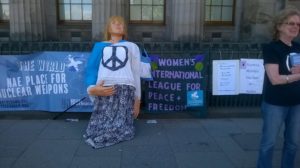‘Banning nuclear weapons can be an act of challenging the patriarchy and building space for a new alternative approach to politics, including feminism’ – Ray Acheson, Director of WILPF’s disarmament programme Reaching Critical Will
7th of July 2018 marked the one-year anniversary since over 120 countries in the international community came together in pursuit of peace and approved the U.N Treaty on the Prohibition of Nuclear Weapons (otherwise known as TPNW and/or the Nuclear Ban Treaty). The UK boycotted all negotiations and has thus far refused to sign. Against a political backdrop of instability where the threat of nuclear conflict is ever-present (16,000 nuclear weapons currently sit in the arsenal of nine nations), the document is ground-breaking. Placing multiple prohibitions and obligations on ratifying states, it makes the overall possibility of disarmament a sustainable reality. It urges us to stop associating such weapons of mass destruction with power and status, and instead to adopt a humanitarian perspective and work toward international co-operation and lasting peace. Crucially, it explicitly recognises the gendered impact of nuclear weapons.
Nuclear weapons are a feminist issue and we are here to tell you why.
- The Economy
Nuclear Weapons act as the largest drain on Government spending. However, Parliament still voted in favour of renewing the UK’s nuclear weapon programme Trident in 2016. The replacement will cost £205 billion, all-while our Government implements some of the most severe austerity measures our country has seen in recent years. Cuts to public services have hit the most vulnerable groups in our society the hardest such as women, BME households and those on lower incomes. For example, 73% of those affected by the public sector pay freeze were women and changes to Universal Credit saw single parents suffer – 9 out of 10 of which are women. Research has proven that nuclear weapons no longer protect our most imminent security interests, so why are we investing in them while women suffer?
- The Aftermath
Should a nuclear weapon detonation happen, a possibility that we cannot dismiss considering the present state of international relations, the impact across the world would be catastrophic. But women may endure suffering that is biological and gender-specific. For example, women are twice as likely to develop cancer from radiation and can experience an increased rate of abortion, stillbirths, and poor psychological health (as was seen following the horrors in Hiroshima and Nagasaki). Moreover, studies have suggested that the crisis and displacement that would surely follow would result in increased levels of sexual violence, decreased access to justice, and increased poverty for women.
- The Representation
When it comes to forums concerned with nuclear weapons and weapons of mass destruction in general, there is a consistent under-representation of women’s voices. This gender imbalance is apparent across the board. For example, a comprehensive study from 1980 to present by the International Law and Policy Institute found that just 1 in 5 delegates present at security delegations were women. Furthermore, even at the negotiations of the Nuclear Ban Treaty itself, 39 out of 125 registered country delegations were all men. This lack of female participation and neglect of women’s voices is problematic for multiple reasons: it denies women a say in issues that heavily impact their lives; it means those making decisions do not adequately represent the composition of our country; and it prevents nuclear policy from engaging with new perspectives and narratives.
- The Language
Language embedded in the discourse of nuclear weapons is deeply gendered. Often the proponents for their use describe weapons using terms associated with masculinity such as ‘power and dominance’. However, when new perspectives enter the debate which focus on their potential to cause genocidal harm to our bodies and catastrophic harm to the environment, these arguments are quickly dismissed as ‘weak, emotional and irrational’ – language coded as feminine. So why does language matter? Because if concerns and feelings considered feminine are dismissed, those with power maintain the status quo: policies based on status, mistrust and fear with no room for international co-operation and peace.
- The History of Activism
There is a rich history of feminist participation and campaigning in anti-nuclear activism. Take grassroots movements like the mass-mobilisation that took place in Greenham Common in 1982 when over 250 individuals created a peace camp to protest the placement of missiles. Or the long-line of academics who have shown that gender and feminism are inextricably linked to weapons of mass destruction (Cohn, Eschle and Acheson – to name a few). Incredible women have laid the foundations of anti-nuclear weapon campaigning, and it is time for us to take the baton and contribute to making the UK a nation of equality, peace and humanity.
So now what? Well, the Nuclear Ban Treaty undoubtedly provides space to adopt a new form of feminist politics. But the UK wont sign. WILPF UK are trying to address this by hosting a Lobby Training Day in Manchester on September 8th. The aim of the day will be to train individuals in lobbying and negotiation skills so that participants may influence local MPs to sign ICAN’s Parliamentary Pledge and thus commit to ensuring the UK becomes the first nuclear-weapon nation to sign. Attendance is completely free, and all allies are welcome. To find out more on how to attend, please click here.
[1] http://www.unidir.org/files/publications/pdfs/gender-development-and-nuclear-weapons-en-659.pdf
[2] https://cnduk.org/wp/wp-content/uploads/2018/02/People-not-Trident-2016.pdf
[3] https://www.ohchr.org/Documents/Issues/Development/IEDebt/WomenAusterity/WBG.pdf
[4] http://blogs.lse.ac.uk/politicsandpolicy/gendered-impacts-of-austerity-cuts/
[5] https://cnduk.org
[6] https://centreforfeministforeignpolicy.org/journal/2016/12/30/a-feminist-analysis-of-nuclear-weapons-part-1-hegemonic-masculinity
